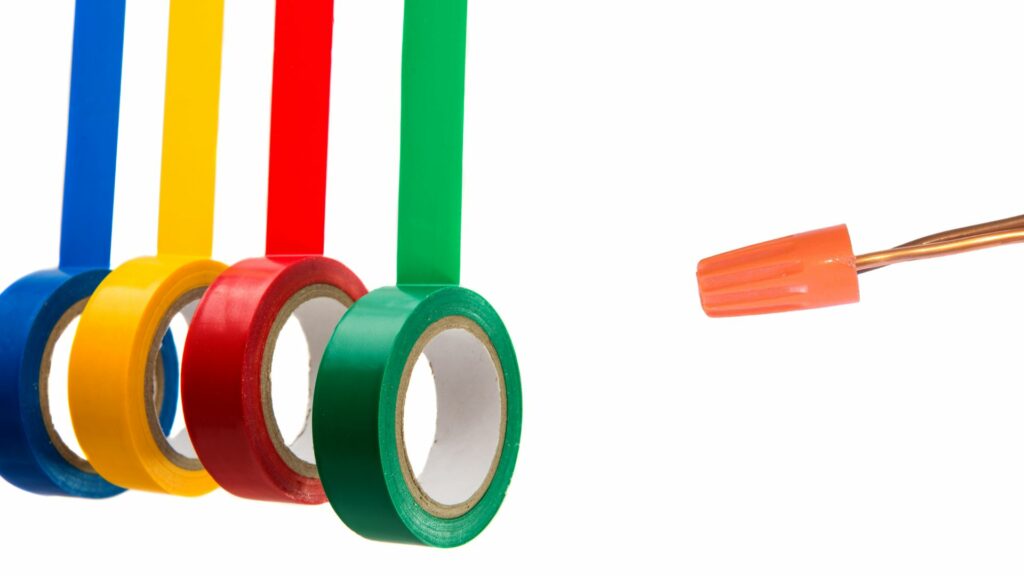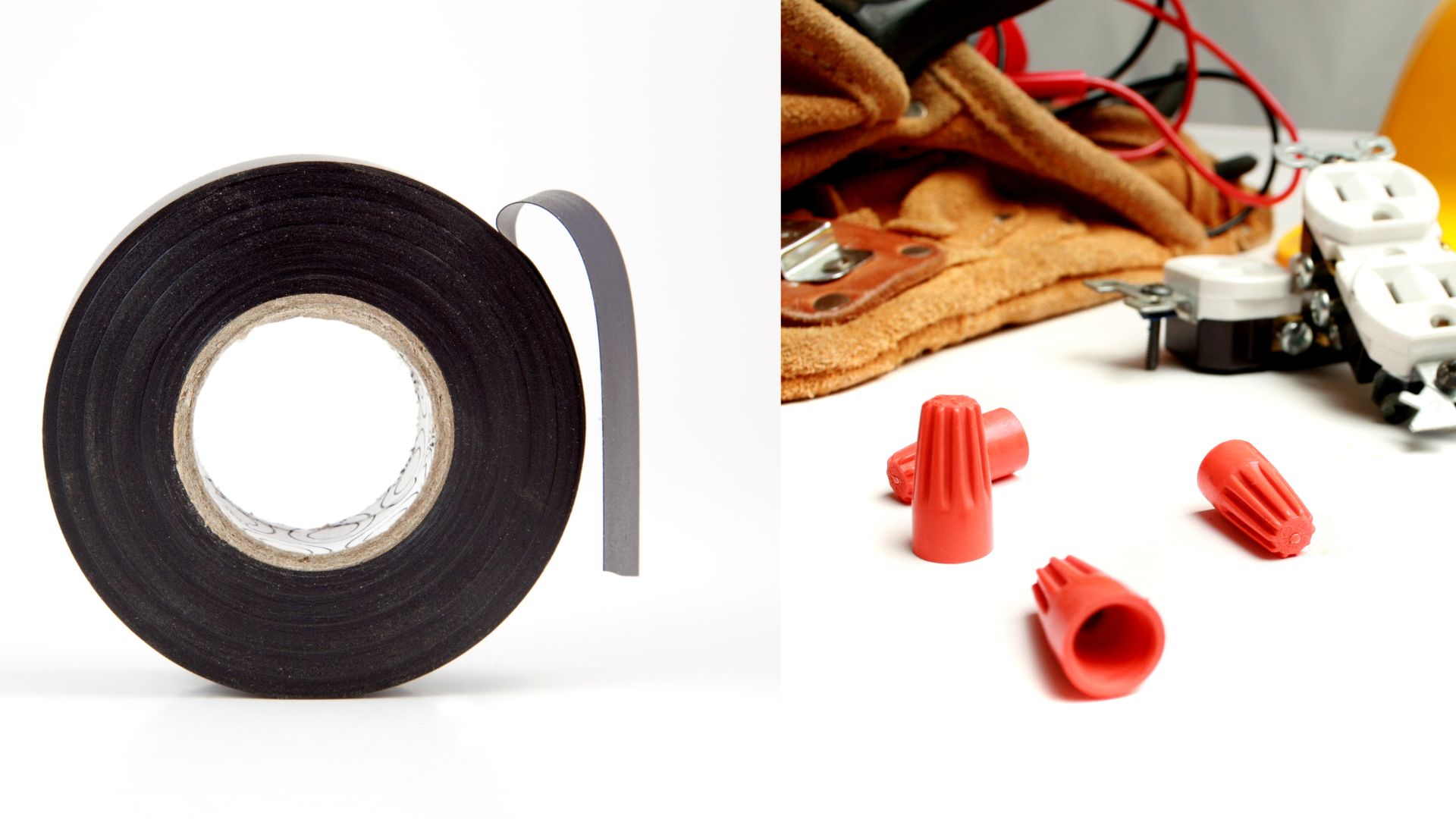Some people use electrical tape instead of wire nuts to connect wires, but is that a good idea? Does the practice make sense?
Consider the following:
1). The Law
Unfortunately, what you think doesn’t matter. You must follow the NEC’s instructions to avoid hefty penalties. The National Electric Code has a detailed set of instructions that cover every electrical consideration and undertaking you may encounter.
Therefore, before you do anything, find out whether the NEC permits using electrical tape instead of wire nuts. Section 110.14(B), seemingly encourages the use of wire nuts because they are suitable splicing devices.
The local code has the final say on this matter. If they permit customers to apply electrical tape instead of wire nuts, you can connect your wires with electrical tape.
2). Purpose
What are you trying to do? The purpose matters. High voltage wires are too dangerous for you to take chances with electrical tape. However, the same cannot be said for speaker wires or the conductors that operate your doorbell.
You’re better off using wire nuts in every scenario. But electrical tape is less risky where low-voltage lines are concerned.
3). Accessibility
What do you have on hand? Many contractors will encourage you to apply wire nuts, but do you have wire nuts in your local store? Many people use electrical tape because it is much easier to find.
If the electrical tape is the only tool at your disposal, don’t hesitate to use it. Tape is better than nothing. Keep in mind that contractors used electrical tape all the time before wire nuts became widespread.
4). Tape on Wire Nut
Rather than choosing between them, some people use both. They apply a wire nut and then wrap it with electrical tape.
While you don’t lose anything, it isn’t necessary. Stick to wire nuts, and leave electrical tape alone.
4). Cost
People gravitate towards electrical tape because it is often cheaper than wire nuts. Then again, wire nuts are equally affordable. The price is unlikely to discourage consumers from using wire nuts.
5). Fire
Electrical tape is not necessarily flammable. But it can melt in the face of high temperatures. It depends on the material. Some electrical tape types will ignite more easily than others. I recommend using PVC and rubber because they can tolerate temperatures as high as 176 and 221 degrees F, respectively.
Electrical Tape VS Wire Nuts

Even when the electrical tape is so easily accessible, experts will compel you to use wire nuts because of the weaknesses electrical tape brings to the table and the benefits associated with wire nuts:
- First of all, wire nuts create a more secure connection than electrical tape. You can trust them to stand the test of time.
- Electrical tape is not a suitable tool for permanent connections. It works best in an emergency. Otherwise, it doesn’t provide the compressive strength you need to keep two or more wires together in the long term.
- Electrical tape will eventually fall away. This is a given. No matter how tightly you wrap it, the item will succumb to the elements, losing its grip over time and sliding off. Wire nuts will persist because of their robust construction. Admittedly, wire nuts can corrode. But even with this weakness, they will last longer than tape.
- The difference in construction matters because the electrical tape is not exceptionally durable, at least not in comparison with wire nuts. You can pull it off with some effort. Electrical tape can break because of exposure to the heat a wire generates when it transmits a current.
All in all, people will continue to flock to electrical tape because the item is much easier to use. However, the tape is best applied when you need to insulate wires. Otherwise, wire nuts are the obvious choice between the two when it comes to creating a secure and potentially permanent connection between wires.
Why Experts Suggest Using Wire Nuts?
- Wire nuts provide a superior grip for your fingers because of the outer ridges and wings.
- Wire nuts create a secure connection that lasts a long time.
- They come in numerous sizes and colors.
- Overheating is less of a risk. Unlike electrical tape, wire nuts do not provide an extra layer of insulation.
- You can combine wire nuts with electrical tape to create a secure seal while simultaneously providing insulation to a frayed wire.
What If I Have No Wire Nuts – How To Safely Use Electrical Tape?
- Pay Attention To The Type.
Electrical tape comes in different types, each boasting a unique set of attributes. Match the characteristics to the need at hand. For instance, you can select a tape that repels corrosive elements because the threats in the vicinity of the wires you want to connect are corrosive.
You can also identify a tape whose temperature limits exceed the temperature of the environment it will inhabit. Even though electrical tape has weaknesses, you can overcome them if you find a tape with the correct characteristics.
- Twist the wires You Want To Connect
The experts at Instructables expect you to twist the wires you want to connect. Focus on the part the tape will cover. Twist this section before laying it on the tape. This allows you to make a more secure connection.
- Wrap The Wires As Many Times As You Need To Create A Secure Connection.
Five or six times is a good starting point. Make sure you cover the wire completely. Tug at the link gently to confirm that it’s secure.
- Don’t Afraid To Stretch The Tape
Electrical tape is flexible. Don’t be afraid to stretch the item as you wrap it around the wires. Stretching the tape makes it more secure. Additionally, stretched electrical tape is less likely to fall off the wires. Stretching the item allows you to apply more layers, which, in turn, provides more protection from the elements.
- Don’t Use Electrical Tape As A Permanent Solution.
Use it when wire nuts become unavailable. Once you get wire nuts, replace the electrical tape.
Things To Consider While Using Electrical Tape
- Get the correct material. Some materials are stronger than others. PVC and rubber tape can resist high temperatures. This doesn’t make them fireproof. However, they can survive in environments that overwhelm other materials. The application will determine the material.
- Have you looked at the grade? Polymeric tapes are durable. They also make tighter seals than their monomeric counterparts. Selecting a polymeric tape guarantees a more reliable connection.
- Does your application require specialized insulation? Are you tempted to add that insulation on top of the tape? Keep the temperatures in mind. An additional layer of insulation creates a risk of overheating.
- What does the code say? You can’t apply electrical tape if the local code prohibits the practice.
Related post:

